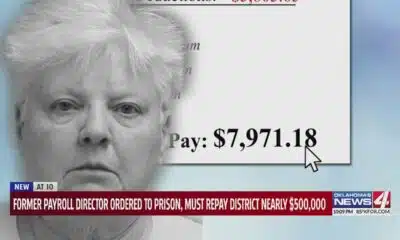News from the South - Arkansas News Feed
Arkansas Senate rejects legislation to increase energy production, attract industry
Arkansas Senate rejects legislation to increase energy production, attract industry
by Antoinette Grajeda, Arkansas Advocate
March 6, 2025
A bill that would alter the process for creating new electricity-generating plants to meet the state’s anticipated energy needs stalled in the Arkansas Senate Wednesday.
As a result of at least two of the state’s coal-fired plants going offline by the end of 2030, Sen. Jonathan Dismang, Searcy Republican and lead sponsor of Senate Bill 307, said energy rates are expected to increase because Arkansas will have to buy energy from an out-of-state utility or build new sources of energy. The goal of the 62-page bill, also known as the Generating Arkansas Jobs Act of 2025, is to mitigate those increases, Dismang said.
“This is a new path forward for us to create the energy that we have to create that will ultimately, because of that new generation that is required, be at a lesser cost of generation than it would be under the old model — the old model that does not have the roadblocks and the reviews and the approvals that this does at multiple steps in the process,” he said.
Renewable energy needed for Arkansas’ future, industry experts tell lawmakers
Under the current model, Dismang said, interest is accrued during construction and then capitalized, creating “a significant jump in rates” once the power plant is operational. SB 307 recommends another option that would allow utilities to begin recovering costs incrementally during construction by enabling “a strategic investment” that he said would result in a “lower, long-term recovery rate for consumers.”
SB 307 proposes that the Arkansas Public Service Commission must approve a strategic investment within six months of application, “ensuring that it is in the public interest,” Dismang said. The PSC then has 60 days to approve the rider rates, but can request another 30 days if additional time is needed.
When construction begins and the new rate is being collected, the PSC will review that project every 12 months, Dismang said. Once completed, the PSC has a one-year audit period to make sure everything was “done prudently so that our ratepayers are protected,” he said.
In addition to saving ratepayers money, Dismang said his proposal “provides more protection and oversight by the PSC because they’re able to monitor what’s happening through the entire process.”
Supporters of the bill have also said it will make Arkansas more competitive in attracting to the state new employers, such as data centers that may require a lot of energy to operate, which would create more jobs.
Sen. Dave Wallace, a Leachville Republican who voted for SB 307, said he chopped cotton growing up because there were no other jobs in Arkansas, a factor that led many in his generation to leave the state.
“You grow or you die,” Wallace said. “…We have opportunity to be in the lead and to have energy and to bring companies to our state…if we have power, we’re going to bring those businesses and Arkansas is going to grow.”
Sen. Reginald Murdock, D-Marianna, said the entire Senate believes in the concept of the bill, but he had concerns about the process and making sure to “protect our ratepayers, specifically the most vulnerable people in the state.”
“I think this process has taken away the ability to provide some alternatives, some Plan B’s, some Plan C’s, that could do a better job of protecting ratepayers if given the time to sit down and deal with this in a different way, from a time standpoint,” Murdock said. “So I do think there are some alternatives that can be brought forward that may help us.”
Sen. Jimmy Hickey, R-Texarkana, said it was important to watch out for ratepayers from a cost and risk standpoint. While he thanked Dismang for his hard work on a complicated bill and agreed action is needed, Hickey said SB 307 is not ready as is.
Hickey called for more discussion about the bill’s proposal to keep Arkansas’ rates at 10% below the national average, noting that by some estimates, Arkansas’ current rate is 25% below that threshold. He also noted that a better definition for “strategic investments” is needed.
“It’s a whole lot easier to come down here and start throwing rocks at it than to sit and devise this type of policy, but again, I just don’t think that we’re ready to go forward,” Hickey said.
Hickey was among 11 senators who voted against SB 307. The legislation received 17 affirmative votes, one shy of the 18 needed for a bill to pass out of the Senate. Murdock was one of four senators who did not cast a vote. Democratic Sens. Greg Leding of Fayetteville and Fredrick Love of Mabelvale, and Sen. Dan Sullivan, R-Jonesboro, voted present.
The Senate voted in favor of Dismang’s motion to expunge the vote, which will allow him to bring SB 307 back to his colleagues at a later date.
GET THE MORNING HEADLINES.
Arkansas Advocate is part of States Newsroom, a nonprofit news network supported by grants and a coalition of donors as a 501c(3) public charity. Arkansas Advocate maintains editorial independence. Contact Editor Sonny Albarado for questions: info@arkansasadvocate.com.
The post Arkansas Senate rejects legislation to increase energy production, attract industry appeared first on arkansasadvocate.com
News from the South - Arkansas News Feed
Idaho is losing OB-GYNs. Doctors who remain are trying to shoulder the extra burdens.
by Kelcie Moseley-Morris, Arkansas Advocate
August 13, 2025
Before Dr. Harmony Schroeder left her OB-GYN practice in Idaho last year for Washington, she’d had many conversations with legislators and others about how to feel safe practicing in a state with a near-total abortion ban that includes criminal and civil liabilities for violating the law.
Schroeder wanted to stay. She’d practiced in Idaho for nearly 30 years, with a patient list of about 3,000 and a group of doctors she loved. She thought once elected officials understood that a ban would mean poorer medical care and more negative outcomes, things would improve.
Instead, they got even worse, as women were airlifted out of state during a period without protection for emergency abortion care under federal law.
Schroeder felt like she was either compromising care for women or compromising herself by risking jail time.
Providers convicted of breaking the law face up to five years in prison, revocation of their medical license and at least $20,000 in civil penalties.
“People said, ‘Oh, we would never really put you in jail,’” she said. “Sometimes it felt like the legislature was giving us a pinky swear.”
Schroeder is one of 114 OB-GYNs who left Idaho or stopped practicing obstetrics between August 2022 and December 2024, according to data from a peer-reviewed study published in JAMA Open Network, a division of the Journal of the American Medical Association. That number represents 43% of the 268 physicians practicing obstetrics statewide, a higher figure than previous reports indicated.
The study showed 20 new OB-GYNs moved to Idaho during that same period, for a net loss of 94 physicians.
Subscribe to Reproductive Rights Today
Want a better understanding of abortion policy in the states? Sign up for our free national newsletter. Reproductive Rights Today is a comprehensive daily wrap-up of changes to reproductive rights in the states, the front lines in the fight over abortion access in a Post-Roe America.
It’s not the only state with a ban experiencing shifts in numbers of obstetrics providers, but it is one of the most acute. Physicians in Texas, Tennessee, Oklahoma and other ban states have spoken to the media and researchers to say they are leaving the state or retiring from the practice because of bans, and while the numbers may not always be statistically significant, the departures are often in states that already have maternal health care shortages.
The states with the highest percentage of maternity care deserts as of 2024 were North Dakota, South Dakota, Oklahoma, Missouri, Nebraska and Arkansas, according to March of Dimes. With the exceptions of North Dakota and Nebraska, every state in that list has a near-total abortion ban in place.
Out of the 55 OB-GYN physicians Idaho lost just in 2024, 23 moved out of the state, 12 retired, and 16 either shifted their practice to gynecology only or moved from a rural to urban practice site. The remaining moved elsewhere in state. All of those who moved away moved to a state that did not have abortion restrictions similar to Idaho’s.
As of 2018, four years before the U.S. Supreme Court’s Dobbs v. Jackson Women’s Health Organization decision that ended federally protected access to abortion, Idaho needed 20 more OB-GYNs to meet demand, according to a report from the U.S. Department of Health and Human Services.
Schroeder likes her new practice in Washington, but she is still sad about the realities that forced her to leave.
“I wish it didn’t have to be this way,” she said.
Study proves ‘what we feared was happening’
Susie Keller, CEO of the Idaho Medical Association, said the losses feel worse because Idaho already consistently ranked at the bottom of nationwide rankings for physician-to-patient ratios even while the population has exploded in recent years.
The Centers for Disease Control and Prevention ranked Idaho lowest in 2019 for overall patient-to-doctor ratios, and the conservative Cicero Institute ranked it 50th in 2024. According to a report from the Idaho Coalition for Safe Healthcare, the ratio of patients to obstetricians increased from 1 per 6,668 Idahoans to 1 for every 8,510 Idahoans between August 2022 and November 2023.
Keller said the medical association has tried hard to find solutions that would help retain physicians, including failed efforts over the past two years to add a health exception in the abortion law.
“Every time there’s been some sort of event that sustained this difficult environment or made it worse, we heard about folks leaving,” Keller said.
The study, which was led by Dr. J. Edward McEachern, is a clear demonstration of what Keller said the medical association already knew anecdotally. It’s also proof, she said, for the elected officials who have accused them of fabricating stories or data and exaggerating the situation. Idaho Attorney General Raúl Labrador said in June 2024 that Idaho doctors who left were doing so because they made “the vast majority of their money” from performing abortions, but he did not provide evidence for that claim. Republican Rep. Brent Crane, who is chairman of the committee where abortion-related legislation would be considered, said in April 2024 that hospital legal counsel was being disingenuous with providers about the vagueness of the law because they want to undermine and ultimately repeal it.
“This kind of dialed-in study really gives us a very clear picture of what we had feared was happening,” Keller said.
Among clinics, not everyone is in agreement about the problems. Scott Tucker, practice administrator for Women’s Health Associates in Boise, said the providers they have lost over the past three years were mostly due to other factors. Increases in clinic wait times are up across the valley because of population growth, he said, and there is a national shortage of OB-GYNs and primary care providers.
“(Idaho’s abortion ban) really hasn’t impacted us much, other than we get a lot of questions and a lot of requests for contraception counseling,” Tucker said.
He added that while it’s never easy to recruit new physicians, and the ban has created extra challenges, they’ve onboarded a new physician once every nine months for the past four years and have two candidates slated to start in 2026. Much of the interest comes from candidates in the Midwest and the East, he said, and “much of what they’re hearing is hyperbole.”
‘I don’t know if it’s fair to the public for them to never feel like this is a problem’
Dr. Becky Uranga practiced with Schroeder for 14 years at OGA, a physician-owned OB-GYN clinic in the Boise area. She watched Schroeder leave, along with another doctor at OGA who went into a different medical field and one who retired.
In June, another longtime OB-GYN announced his departure. Dr. Scott Armstrong, who had practiced in the area for 26 years, sent a letter to patients saying his last day at OGA will be on Oct. 17, when he will move back to the Midwest “to help care for my aging parents and embark on a new chapter in my life.”
Uranga said the practice will have eight practicing OB-GYNs by October — down from 12 a few years ago. And the closure of other labor and delivery units in the area, which is the most populous in the state, has increased workloads for clinics like OGA as well. Uranga’s practice provides the full spectrum of obstetrics and gynecological care for women of all ages, including surgeries and labor and delivery.
“All those people (from the closed clinics) then came to us,” Uranga said.
What used to be two or four deliveries on average in a 24-hour shift is now five to six.
“That’s a lot, and it’s a really special moment that you want to be all in, present and available for whatever could happen … and it doesn’t feel like that anymore,” she said.
When a physician leaves, especially ones that have been practicing for a long time, Uranga said it leaves a hole. Schroeder had 3,000 patients, and many of them were receiving care for menopause, which she specialized in. Uranga sought out extra training to become board certified in menopause care to fill that gap.
While they juggled the transition with fewer physicians, OGA temporarily limited new patients for certain services, including some Medicaid patients. Uranga also isn’t traveling to a rural area of Idaho anymore to provide surgeries, something she and Schroeder used to do together.
When she’s not doing clinic visits, patient calls, surgeries or deliveries, she’s helping with organizing and fundraising efforts for the reproductive rights ballot initiative that would restore abortion access in Idaho. And in between all that, she’s scheduling recruiting calls with potential physicians.
She recently had to tell a recruitment coordinator that they need to be transparent up front about Idaho’s abortion laws, because she wasted too much time talking to candidates who responded with a hard no after learning about the medical environment.
“My nurse will tell you that I am fitting people in before, during, and after (hours) all the time, which isn’t fair to my family, it’s not fair to my nurse, and I don’t know if it’s fair to the public for them to never feel like this is a problem,” Uranga said.
This story has been updated.
Arkansas Advocate is part of States Newsroom, a nonprofit news network supported by grants and a coalition of donors as a 501c(3) public charity. Arkansas Advocate maintains editorial independence. Contact Editor Sonny Albarado for questions: info@arkansasadvocate.com.
The post Idaho is losing OB-GYNs. Doctors who remain are trying to shoulder the extra burdens. appeared first on arkansasadvocate.com
Note: The following A.I. based commentary is not part of the original article, reproduced above, but is offered in the hopes that it will promote greater media literacy and critical thinking, by making any potential bias more visible to the reader –Staff Editor.
Political Bias Rating: Left-Leaning
This content highlights the negative consequences of strict abortion bans on healthcare providers and patient care in Idaho, emphasizing the challenges faced by OB-GYNs and the resulting healthcare shortages. It presents critical perspectives on the state’s abortion restrictions and includes voices advocating for reproductive rights, which aligns with a left-leaning viewpoint that supports abortion access and critiques restrictive policies.
News from the South - Arkansas News Feed
Look inside the newly-renovated Greer Lingle Middle School in Rogers
SUMMARY: Greer Lingle Middle School in Rogers reopens after being closed for over a year due to tornado damage causing $12.7 million in repairs. Renovations include new floors, ceilings, lights, and updated hallways. Contractors are finishing final touches inside and outside the building as 680 students prepare to return. Principal Eric Sokol praised the community’s resilience and noted the academic challenges faced during the temporary relocation to Rogers New Tech. Despite delays, students had a solid year. The renovated school features a new science classroom and library, aiming to create a safe, welcoming environment. Some projects, like the performing arts center, remain underway.
Students in the Rogers School District return to class on Wednesday
Subscribe to 40/29 on YouTube now for more: http://bit.ly/PTElbK
Get more Northwest Arkansas news: http://www.4029tv.com
Like us: http://facebook.com/4029news
Follow us: http://twitter.com/4029news
Instagram: https://www.instagram.com/4029news/
News from the South - Arkansas News Feed
U.S. Education Secretary visits Arkansas
SUMMARY: U.S. Education Secretary Linda McMahon visited Arkansas as part of her nationwide tour promoting the return of education control to states. Meeting with Governor Sarah Huckabee Sanders at Dunn Roberts Elementary School in Little Rock, McMahon emphasized dismantling the Department of Education to reduce federal bureaucracy and increase local decision-making. The Trump administration argues this shift will expand family choices and empower communities, while critics warn it may reduce oversight and harm vulnerable students. McMahon highlighted Louisiana’s educational improvements as a model. After Little Rock, she toured the Saline County Career and Technical campus in Benton. Full coverage will follow in evening news.
U.S. Secretary of Education Linda McMahon is visiting Arkansas as part of the “Returning Education to the States” 50-state tour.
-
News from the South - Oklahoma News Feed6 days ago
Former payroll director ordered to prison, must repay district nearly $500,000
-
News from the South - Texas News Feed7 days ago
Jim Lovell, Apollo 13 moon mission leader, dies at 97
-
News from the South - Alabama News Feed7 days ago
Community Fundraisers Support Family of Mountain Gap Student Killed on Bike | Aug. 8, 2025 | News 19
-
News from the South - Tennessee News Feed6 days ago
Dollywood shares hints about new attraction coming in 2026
-
News from the South - Georgia News Feed6 days ago
GBI identifies Emory University, CDC shooting suspect
-
Local News7 days ago
Trump says he will meet Putin next Friday in Alaska to discuss ending the Ukraine war
-
News from the South - Louisiana News Feed6 days ago
Rural emergency rooms are increasingly run without doctors, experts say
-
News from the South - Georgia News Feed6 days ago
Patrick Joseph White: Who is the accused Emory and CDC shooter?










































